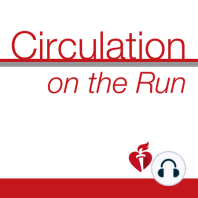16 min listen
Circulation April 30, 2019 Issue
ratings:
Length:
24 minutes
Released:
Apr 29, 2019
Format:
Podcast episode
Description
Dr Carolyn Lam: Welcome to Circulation on the Run, your weekly podcast summary and backstage pass to the Journal and its editors. I'm Dr Carolyn Lam, associate editor from the National Heart Center, and Duke National University of Singapore. Dr Greg Hundley: And I'm Greg Hundley, associate editor as well, at Circulation, and director of the Pauley Heart Center in Richmond, Virginia at VCU Health. Carolyn, this issue, we've got a super-exciting interaction to follow related to SGL2 inhibitors on 24-hour ambulatory blood pressure in African-Americans, something used to treat diabetes, and maybe a positive effect on blood pressure, but more to come on that. Now, Carolyn, you're also planning to discuss some results from another SGL2 study. Dr Carolyn Lam: You bet. This time, I'm taking you to Japan for the results of the SACRA study which stands for SGLT2 Inhibitor and Angiotensin Receptor Blocker Combination Therapy in Patients with Diabetes and Uncontrolled Nocturnal Hypertension and this is from Dr Kario and colleagues from Tochigi in Japan. It's a multi-centered, double-blind parallel study of 132 non-obese older adults with type 2 diabetes and uncontrolled nocturnal hypertension, receiving stable antihypertensive therapy, including angiotensin receptor blockers, who were then randomized to 12 weeks' treatment with empagliflozin 10 milligrams once daily or placebo. Clinic blood pressure was performed at baseline in weeks four, eight and 12. Twenty-four hour ambulatory blood pressure monitoring was performed at baseline and week 12 and morning home blood pressure was determined for five days before each visit. The primary efficacy endpoint was changed from baseline in nighttime blood pressure. Dr Greg Hundley: So, what did they find, Carolyn? Dr Carolyn Lam: Well, empagliflozin significantly reduced nighttime systolic blood pressure versus the baseline. The reductions in daytime 24-hour morning, home, and clinic systolic blood pressure at 12 weeks with empagliflozin was also greater than placebo. Between group differences in body weight and glycosylated hemoglobin reductions were significant, but small and the changes in antihypertensive medication during the study also did not differ significantly between the groups. Dr Greg Hundley: Very good. Well, I'm going to switch gears and talk also on the same theme of sugar and diabetes and evaluate the long-term consumption of sugar-sweetened and artificially-sweetened beverages and the risk of mortality in U.S. adults. This is a study by Vasanti Malik from the Harvard School of Public Health. Now, as you know, in epidemiologic studies, intake of sugar-sweetened beverages has been associated with weight gain, a higher risk of type 2 diabetes, coronary heart disease and stroke, but to date, few studies have examined the association between sugar-sweetened beverages and intake and mortality. All right, Carolyn, I'm going to give you a quiz now. Here's the first question. Dr Carolyn Lam: What? Dr Greg Hundley That's right, sugar-sweetened beverages are the single largest source of added sugar in the U.S. diet, true or false? Dr Carolyn Lam: I'm going to guess true. Dr Greg Hundley: Okay, so all those consumption of sugar-sweetened beverages in the United States has decreased in the past decade. National survey data show a slight rebound in consumption in recent years among adults in many age groups. With the average equivalent being, multiple choice, 2%, 6.5% or 10% of our total energy requirements? Dr Carolyn Lam: Oh, my goodness. One of the higher ones. I'm just going to go in the middle, 6.5. Dr Greg Hundley: Excellent, good choice,
Released:
Apr 29, 2019
Format:
Podcast episode
Titles in the series (100)
Circulation August 30, 2016 Issue: Circulation Weekly: Your Weekly Summary & Backstage Pass To The Journal by Circulation on the Run
